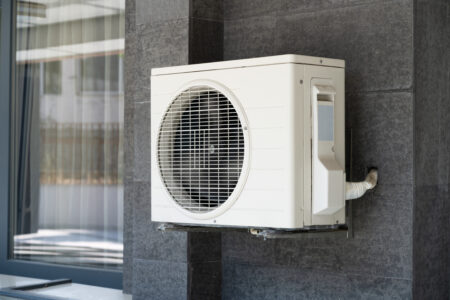If you’re looking to upgrade your home’s heating and air conditioning, a variable-speed heat pump can be one of the best options. Variable-speed heat pump systems provide many benefits over standard HVAC systems in terms of energy efficiency and comfort. In this article, we’ll explain how variable-speed heat pumps work and show you the benefits this type of unit can provide to your home.
1. Highly Efficient Cooling and Heating
The first thing you should understand about heat pumps is that they provide both heating and air conditioning and are the most efficient heating option available. Compared to furnaces and other types of electric heat, heat pumps tend to use far less energy. Heat pumps work by transferring heat instead of generating it.
Even when it’s cold outside, the air does have some heat. While heat pumps used to be recommended primarily in southern areas, technological improvements mean they are a viable option further north. We often recommend an auxiliary heat source for the coldest times in our climate. Nonetheless, a heat pump will still generally be the least expensive heating option. However, a geothermal heat pump is usually sufficient to heat your home even during an extreme cold snap.
While all heat pumps are quite efficient when cooling and heating, variable-speed heat pumps are far more efficient than standard single-stage heat pumps. A single-stage heat pump has two settings: on or off. It always runs at full speed. This means they are turning on and off repeatedly throughout the day. This start-up process uses the most energy and puts the most stress on the system.
Variable-speed heat pumps, on the other hand, can vary the speed of the blower. They are designed to run continuously at a lower speed, which still uses less energy than a single-speed heat pump. This type of heat pump can use anywhere from 25-50% less electricity than a standard single-speed blower.
2. Consistent Temperature Control
Because variable-speed heat pumps are meant to run continuously during the hottest and coldest times of the year, they can also retain a more consistent temperature. One of the biggest issues with single-stage units is that they run so quickly that they turn on and off multiple times per hour. This leads to the temperature inside the house quickly increasing or decreasing not long after the heat pump shuts down. A similar issue is that single-stage units may not always run long enough to fully heat or cool every part of the home. This is why you’ll often have cold or hot spots in certain parts of the home.
By continually adjusting the speed at which they run based on the current temperature and how much heating or cooling is required, a variable-speed heat pump keeps the temperature almost exactly where you want it. That means your home will typically never be more than 1-2 degrees warmer or cooler than what you have your thermostat set to. Running continually at a slower speed also enables the heat pump to evenly distribute the hot or cold air more effectively. That means you won’t have to deal with rooms that consistently stay warmer or colder than you want.
3. Better Humidity Control
The summers in the St. Louis area tend to be extremely humid and muggy. This creates issues in terms of indoor comfort since the more humid the air in your home is, the hotter you’ll feel. All air conditioners and heat pumps help with humidity control as they condense moisture from the air. The issue is that single-stage units often aren’t effective enough to manage humidity issues on their own, which is why many homes in humid climates also need a whole-house dehumidifier.
Single-stage units don’t always provide effective enough humidity control because they typically never run for more than 15 to 20 minutes at a time. That means they can’t remove all that moisture inside the home before they shut off. This is another area where variable-speed heat pumps have a significant advantage. Even when the system runs at the lowest speed possible, quite a bit of moisture will continually condense on the system’s evaporator coil. The fact that the system runs constantly means it continually pulls lots of moisture out of the air, making the entire home feel drier and far more comfortable.
One major issue with high indoor humidity is that it often leads people to turn the temperature on their thermostat down even further to feel more comfortable. The fact that a variable-speed heat pump can keep your home from ever being too humid will make it feel cooler and more comfortable. As such, you can set your thermostat a few degrees higher to save on energy without negatively impacting your comfort level.
4. Long Life Expectancy
One drawback to heat pumps is that they usually don’t last quite as long as other HVAC units. This is because they get far more use since they work to heat and cool instead of only providing heating or cooling as other units do. The average life expectancy of a single-stage heat pump is around 10 to 12 years. Some units may not last that long, especially if they’re not properly maintained. This is yet another area where variable-speed heat pumps have an advantage.
A single-stage heat pump is under huge strain as it turns on and powers up its motors. This type of unit will usually have to turn on two to three times per hour, which leads to a lot of wear and tear that can shorten its lifespan. One way to think about this is like driving a car. When a single-stage unit turns on, it’s like going from zero to 100 miles an hour as fast as possible and pushing the car’s engine to the limit.
A variable-speed unit always starts out at a lower speed. It then slowly increases its speed as necessary, which reduces the strain and limits the wear and tear on its motors. There is also much less overall strain on a variable-speed heat pump when it isn’t running at its highest speed. This reduced strain is the main reason you can usually expect a variable-speed heat pump to last a few years longer than a standard unit.
5. Incredibly Quiet Operation
One last benefit of variable-speed heat pumps is that they run extremely quietly. A variable-speed unit will be just as noisy as a single-stage unit when it runs at full speed. Nonetheless, it will produce very little noise the majority of the time since it will mostly run at lower speeds. The fact that the heat pump sits outside means you usually won’t hear much or any noise from inside your house.
Since 1975, Level 9 Heating, Cooling, and Plumbing has been helping residents in Washington, MO and the greater St. Louis area with their air conditioning, heating, and plumbing needs. We specialize in all types of cooling and heating system installation, maintenance, and repair, as well as indoor air quality solutions. We also offer plumbing services. For more information on the benefits you can enjoy by installing a variable-speed heat pump or to schedule a consultation, contact Level 9 Heating, Cooling, and Plumbing today.



